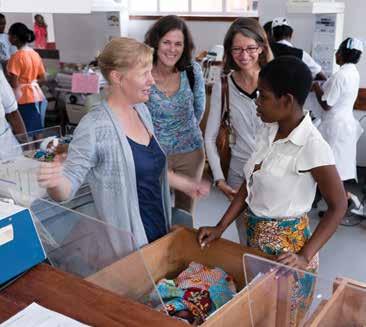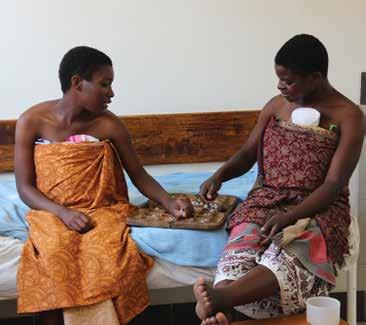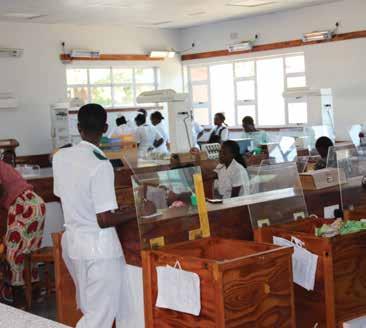
8 minute read
Engineering Better Baby Health: A Malawi Tale
An infant receiving life-saving oxygen through Rice 360°’s Pumani bCPAP machine, which is used to treat patients with respiratory distress syndrome. Pumani means “breathe easy” in Chichewa, the language of Malawi. The medical device costs approximately 1/15th the price of CPAP devices used in U.S. hospitals, yet provides the same therapeutic pressure to patients and is designed to run for years at a time.
Engineering Better
Baby Health:
A Malawi Tale
by Susan Enfield ’83


Even at FVS, I knew I wanted to work in global health and bioengineering,” says Olvera. An early Global Scholar at FVS, Olvera studied and experienced the wider world, traveling to the West Bank and exploring her own family’s Mexican roots through a capstone project on Latino identity in the U.S. “ This is the story of Samantha Olvera ’11, a former FVS Global Scholar and bioengineer who is helping to save babies’ lives and improve neonatal care in the southeastern African country of Malawi.
Sam Olvera at Zomba Central Hospital in Malawi.
t’s a rare college graduate who would happily pack up and leave home for two years of work in one of the world’s least-developed countries, and one of Africa’s poorest. Then again, Samantha (Sam) Olvera has a tendency to put a positive spin on things. Describing the series of corrective surgeries that punctuated her childhood due to being born with a cleft palate, for instance, she says, “It was not bad. Being in the military we were very lucky to have great health care. I really appreciated all the people who took care of me.” Being well cared-for in a healthcare setting early on seems to have made a deep impression on Olvera. “I have always felt that access to health and having that chance to live a healthy life is a basic human right,” she says. “Even though [global health] problems are complex and you can’t just expect to fix everything, it’s important to me to focus on the things I can do, and to do those small things well.” Bringing health to babies in need Olvera first traveled to Malawi on a summer internship with Rice 360° Institute for Global Health, the nonprofit organization she now works for. Then midway through her bioengineering degree at Rice University, she was there to help introduce a medical device that helps prematurely born babies with respiratory distress survive by providing a small amount of continuous pressure in the lungs so they don’t collapse. Malawi has high infant mortality rates and the highest rate of premature births in the world. It was these grim statistics that first brought Olvera to the small, largely rural country that’s nicknamed “The Warm Heart of Africa.” In her blog, she writes, “Like so many others, I came here with the intention of Helping People and left more confused than ever about issues of global health.” I “BAD THINGS THAT HAPPENED OVER THE LAST MONTH: 1. Getting schistosomiasis [a parasitic disease carried by fresh water snails] from my Lake Malawi trip. “
2. Not having running water at our house for over a week. Sadly, this period also overlapped with a few days of power outage. 3. Getting malaria.”
— excerpt from “Long Way from Home,” a blog post by Sam Olvera samolvera.wordpress.com “
On water outages: “AFTER CARRYING TWO BUCKETS OF BORROWED WATER FROM OUR GARAGE ACROSS THE HOUSE TO MY BATHROOM, I now have a profound appreciation for the amount of water it takes to flush a toilet.” Long Way from Home Entry #1
“Mother walking with her baby in Blantyre, Malawi. “

Malawi’s high prematurity rates are closely related to adolescent pregnancies as well as diet and nutrition, Olvera says. “There are a lot of food shortages due to poor harvests of crops like maize that are dependent on weather.” During her internship, she says the hardest part was watching children suffer in hospital wards and collecting data on babies dying of respiratory distress or malaria. “It took an emotional toll,” she says.
The silver lining: In the initial clinical study for the Pumani CPAP (continuous positive airway pressure) medical device Olvera works with, the survival rate for babies with respiratory distress at the Queen Elizabeth Central Hospital jumped from 20 percent to 65 percent. “These were really promising results, similar to what is seen when CPAP is used in developed countries,” Olvera says.
Overall, Olvera fell in love with Malawi, with the people she worked with, and with the “hands-on” work itself—which is why she returned to continue as a program associate with the Malawi project in June 2015.
Going local
Based in Colorado Springs, Olvera’s family was “definitely really nervous to have me living here permanently,” she says. “They are happy for me, but they worry a lot. We do WiFi texting and calling. But often, the connection is not good.” Now one year into her planned two-year stint, she visits the U.S. about every six months.
Olvera describes her life in Blantyre, Malawi’s secondlargest city and commercial center, as a study in contrasts. “We have to get used to water and power being out,” she says. “At the same time, the cost of living is so low, we can afford things here we could never afford in the U.S., like a housekeeper and guards.” The pace of life is generally slower, she says, with weekend activities like hiking and board game nights. She is very close with her work team and has made friends at church and while playing volleyball.
Olvera’s blog wryly chronicles her adventures—and a few misadventures. She describes learning to cook (and appreciate) Malawi’s staple food, nsima, maize flour
a car jammed with equipment to visit each district. “We’re currently working in all 28 government hospitals and are expanding to the eight mission hospitals,” she says. “It’s a month-long marathon with lots of driving.” The team records the data collected by staff from the hospital’s CPAP machine since last visit, makes any repairs, delivers supplies and helps with any challenges. The CPAP technology is starting to help move the needle on infant mortality in Malawi. “When it’s used quickly on the right candidates, it is very successful,” Olvera says. “But there are challenges like power outages.” Blackouts worsen during the rainy season at the end of each year. After one more year helping get the CPAP project running smoothly, Olvera says she’ll be ready to come home. She would like to go back to school and earn a master’s degree, although she’s not sure yet in which field. Asked what has been her biggest learning experience during her sojourn in Malawi, Olvera stops to consider the question before answering. “I used to think more confidently that health problems were the most important ones to solve,” she says. “I still think health is incredibly important because it is related to so many other things. But I’ve also gotten to see the bigger picture. Trying to solve these health problems, you discover that they are related to energy and education and lots of other things.” In other words, there is no magic key to solving challenging health problems—or other complex global issues. But for Olvera and others who work to improve the lives of others, it is enough to focus on the good that can be done. And to do those small things well. Learn more about the Rice 360° Institute for Global Health’s important work to improve health worldwide at rice360.com. On contracting malaria: “NEVER AGAIN WILL I CHOOSE TO NOT USE A MOSQUITO NET because it’s annoying.” Long Way from Home Entry #2 mixed with water and boiled into bland lumps served with vegetables. She discovers that pumpkin leaves cooked in peanut flour and tomatoes are delicious—and sheepishly admits to her local friends that back in the States, we discard the leaves. She adopts a puppy, Thoko, and documents his growth. She slogs through the Blantyre Annual Events, a grueling 21-mile walk that includes scaling three local peaks over the course of several hours. Global Health Tech: Adapting medical equipment to function in low-resource settings At Rice, Olvera learned to design and prototype medical equipment, knowledge she expanded during another Rice 360° internship with the World Health Organization in Switzerland. “The concept behind global health technologies isn’t necessarily to develop a totally new type of technology,” she says. “It’s more about reinventing existing technologies so they can be used in a low-resource setting. You’re looking at a different set of criteria: It has to be low cost, easy to maintain, really robust and easy to use. In other words, both sustainable and suitable.” Now, back at the Central Hospital in Blantyre, Olvera works on everything from budgets and training to supply chain and grant writing. Every quarter, her team travels in “ “
In QECH’s modern ward, made possible through the joint efforts of the ELMA Foundation and Rice 360°. Left to right: Dr. Josephine Langton of QECH, Rice 360° bioengineering professor; Dr. Maria Oden, Rice 360° co-director Rebecca Richards-Kortum (a recent MacArthur award recipient); and a mother of a neonatal patient.

Two new moms practice “kangaroo care” as they play a game at Queen Elizabeth Central Hospital in Blantyre.
On electrical outages: “I CONTINUE TO SUBSIST MOSTLY ON CEREAL, GRANOLA, YOGURT AND FRUITS. I OFTEN ENJOY ROMANTIC CANDLE-LIT EVENINGS ALONE IN MY ROOM, just waiting for the possibility of cooking food and using my fan to keep the mosquitoes and heat at a bearable level.” Long Way from Home Entry #3 “
“The new neonatal ward









